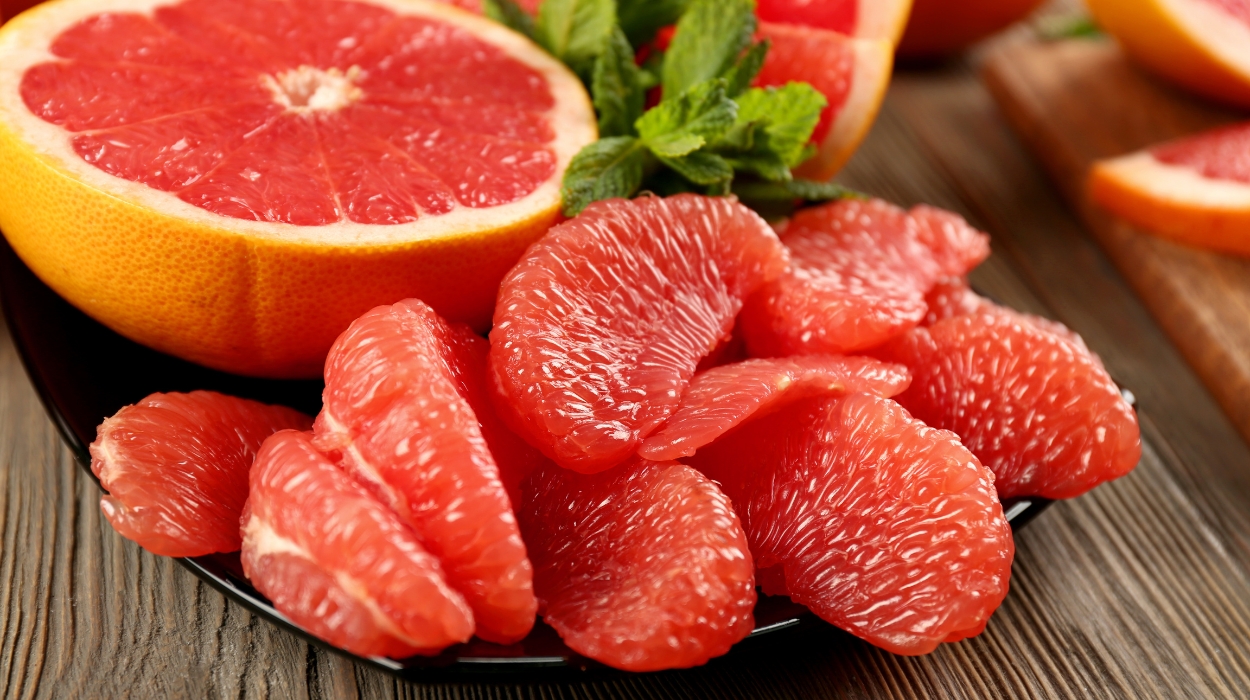Grapefruits are large, bitter-sweet citrus fruits known for their high vitamin C content and diverse health benefits. They are one of the best fruits for weight loss, but this is far from the limit of what grapefruit can do for your body.
Research has found that this hybrid citrus may improve your cardiovascular health,[1] reduce your risk of diabetes,[2] and boost your immune system.[3] It also has anti-cancer properties,[4] promotes wound healing,[5] and can even help you lose weight.[6]
Read on to learn more about grapefruit’s benefits and how you can include more of this fruit in your diet.
Health Benefits Of Grapefruit
- Weight loss benefits.
- Reduced risk of diabetes.
- Improved cardiovascular health.
- Benefits immune system.
- Anti-cancer properties.
- Promotes wound healing.
Health Benefits Of Grapefruit

Fresh fruits and vegetables are vital for a healthy diet, but some are better for you than others. Grapefruit is so full of vitamins, minerals, and antioxidants that many people consider it a superfood. It can lower high blood pressure,[7] improve heart health,[1] boost your immune system,[8] reduce your risk of cancer,[4] and even help you lose weight.[6]
Read on to discover the health benefits of grapefruit, how to get more grapefruit into your diet, and the benefits and side effects of grapefruit consumption.
Weight Loss Benefits
Grapefruit has a long-standing reputation as a weight loss aid thanks to the cultural popularity of the grapefruit diet. The grapefruit diet,[9] thought to have originated in the United States in the 1920s, incorporates grapefruit into every meal and has seen sporadic popularity throughout the 1900s.
The grapefruit diet is anecdotally effective but is not recommended for healthy weight loss. Centering every meal around one specific food can severely limit the diversity of your diet and deprive your body of vital nutrients. Therefore, if you want to eat grapefruit for weight loss, it is best to do so as part of a balanced diet.
Grapefruit is best enjoyed as a snack or a light breakfast. This citrus fruit is sweet enough to satisfy sugar cravings but is low in calories, so it won’t add too much to your overall calorie intake. Grapefruit is also high in dietary fiber, which can help keep you full[10] and curb your appetite for energy-dense snacks.
Reduced Risk Of Diabetes
Grapefruit is a low-glycemic or low-GI fruit, meaning it won’t cause your blood sugar to skyrocket. Eating grapefruit and other low-GI fruits and vegetables can help keep your blood sugar stable, reducing your risk[2] of type 2 diabetes.
Grapefruit also contains naringenin, a citrus fruit polyphenol thought to have anti-diabetic properties. A series of animal studies[11] found that naringenin has many health benefits, including reduced body weight, cholesterol, and blood sugar levels. These results indicate that naringenin has potent anti-diabetic properties, so eating grapefruit may help to protect against type 2 diabetes.
Improved Cardiovascular Health
Regularly eating citrus fruits such as grapefruit boosts heart health and may reduce your risk of cardiovascular disease. This is because citrus flavonoids, such as naringenin, have a wide range of health benefits that directly improve the function of your heart and blood vessels.
Research has found[7] that citrus flavonoids can improve the function of arteries and other blood vessels, reduce cholesterol, and lower blood pressure. As a result, it’s thought that fruit and vegetable supplements containing grapefruit and other citrus extracts may reduce your risk[1] of heart disease.
Further studies found[12] that drinking grapefruit juice reduced arterial stiffness in one group of women. Arterial stiffness is a loss of flexibility in the walls of arteries and is associated with an increased risk of heart attack.[13] Therefore, regularly consuming grapefruit and juice may help keep your heart and blood vessels healthy and protect you from heart disease.
Benefits Immune System
Grapefruit is a rich source of vitamin C, a powerful antioxidant that plays a crucial role in immune function.[14] Vitamin C is essential for the functioning of immune cells and, as a result, for clearing microbes from your body. Eating vitamin C-rich foods like grapefruit, other citrus fruits, and green leafy vegetables can strengthen your immune system and help prevent infections like the common cold.
Anti-Cancer Properties
Vitamin C is just one of the antioxidants found in grapefruit. Lycopene, beta carotene, naringin, and naringenin, are all abundant in fresh grapefruit[15] and grapefruit peel, and all have powerful antioxidant properties.
Antioxidants neutralize free radicals in the body, preventing them from damaging DNA and causing cancer. Adding antioxidant-rich foods like grapefruit to your diet can, therefore, reduce your risk of getting cancer in the future.
For example, lycopene — an antioxidant carotenoid found in pink grapefruit — has anti-cancer effects[4] that can reduce the risk of breast, ovarian, lung, prostate, and stomach cancer. Naringin and naringenin are flavonoids that are so effective in suppressing cancer[16] that they may one day be used as anti-cancer drugs.
Grapefruit essential oil is so full of medicinal nutrients that it has been found to kill microbes and inhibit the growth of tumor cells.[17] As such, grapefruit oil may also have applications in treating cancer and other infections.
Promotes Wound Healing
Eating grapefruit can help promote wound healing thanks to its high vitamin C content. Your body uses vitamin C in all parts of the wound-healing process, which is especially important for tissue regeneration.[18] Therefore, people with chronic wounds like pressure ulcers may benefit from eating vitamin C-rich foods like grapefruit.
What Is A Grapefruit?

Grapefruit is a hybrid citrus fruit produced by the cross-breeding of orange and pomelo,[19] a large citrus fruit native to Southeast Asia. The different varieties of grapefruit are distinguished by their pulp color, ranging from white or pale yellow to pink or red.
All grapefruit have a slightly sweet taste with bitter notes. The bitterness of grapefruit is primarily caused by naringin[20] and is most abundant in white grapefruit.[21] Red or pink grapefruits contain less naringin and, therefore, have a slightly sweeter flavor.
Nutritional Value Of Grapefruit
Half a grapefruit contains 51.7 calories,[22] 0.95 grams of protein, 8.5 grams of sugar, and just under 2 grams of dietary fiber. Grapefruit has an impressive nutritional profile and is a rich source of calcium, magnesium, phosphorous, potassium, folate, and choline. It also contains a healthy dose of vitamin C, A, E, beta carotene, lycopene, and lutein.
There are not many calories in half a fresh grapefruit, which is one reason for its popularity as a diet food. A whole medium grapefruit delivers just a little over 100 calories, making it the ideal snack for those on a weight loss journey.
Why Is Grapefruit Sometimes Bad For You?
The impressive nutritional content of grapefruit makes it a popular health food, but some people must avoid it. This is because grapefruit can interact with certain medications and affect the way they work.[23] Prescription drugs that interact with grapefruit include some statins or cholesterol-lowering drugs, drugs used to treat high blood pressure, organ-transplant rejection drugs, anti-anxiety drugs, antihistamines, corticosteroids, and heart medications.
These drug interactions can be dangerous because they may increase the amount of medication in your bloodstream. In some cases, this can lead to an increased risk of kidney and liver damage.[24] If you are taking medication, always consult your doctor or pharmacist before eating grapefruit or drinking grapefruit juice.
Even if you don’t use medications, you may want to avoid grapefruit if you have a citrus allergy. Citrus allergies are rare,[25] but they can be triggered by contact with any citrus fruit, including lemons, limes, oranges, pomelos, and grapefruits. They can also cross-react with pollen allergies in susceptible individuals.
Tips To Eat Grapefruit
Incorporating grapefruit into your diet has a wide range of potential health benefits. For many people, fresh grapefruit is a delicious and refreshing snack and can be enjoyed just as it is. However, some people dislike acidic foods, and grapefruit’s bitter taste may be too much for others.
If the fresh fruit is too tart for your taste, there are other ways to enjoy grapefruit. Grapefruit salsa can be made by mixing chunks of grapefruit with savory salad vegetables like
bell pepper, jalapeno, red onion, and tomato. These veggies can offset the bitterness of grapefruit, while the grapefruit brings a pleasant touch of sweetness to your salsa.
Grapefruit slices can also be sweetened with a dusting of brown sugar or by blending it with sweeter fruits like banana, peach, or papaya. If you don’t want to increase your daily sugar intake, try sprinkling your grapefruit slices with salt. It may sound odd, but salt can balance the sourness of grapefruit and make it taste sweeter.
If you don’t want to eat grapefruit or can’t due to medication interactions, you can look for green powders that contain the same vitamins and minerals. The best green powders are also rich in antioxidants, like vitamin C, and have many of the same benefits as whole grapefruit.
The Bottom Line
If you’re eating healthy, adding grapefruit to your diet is a guaranteed way to increase your intake of vitamins and minerals. Grapefruit has so many health benefits that it is widely considered a superfood; it can help reduce blood pressure, improve immune function, and strengthen your cardiovascular system. Grapefruit is also thought to promote wound healing and reduce your risk of serious medical conditions such as diabetes and cancer.
Most people can eat fresh grapefruit every day, but those on medication must proceed with caution. Certain medications can interact with grapefruit, so check with your doctor before you drink grapefruit juice or eat the fruit.
Frequently Asked Questions
Consuming grapefruit has a wide range of health benefits. It can boost your immune function, improve cardiovascular health, help you lose weight, promote wound healing, and reduce your risk of diabetes and cancer.
Grapefruit is packed with powerful antioxidants, including lycopene, vitamin C, naringin, and naringenin. The main benefit of antioxidants is that they neutralize free radicals before they can damage your DNA, which may reduce your risk of cancer.
Grapefruit is considered one of the healthiest fruits on the planet due to its low-calorie content and rich nutritional profile. Eating grapefruit regularly can benefit almost every facet of your health, and may protect you from diabetes and cancer.
Proponents of the grapefruit diet claim that grapefruit contains enzymes to burn belly fat. Unfortunately, this isn’t true; no food will burn fat for you. However, eating grapefruit as part of a healthy diet may help you to lose weight.
Oranges are a highly nutritious fruit, but grapefruits contain more antioxidants. Antioxidants have potent anti-cancer properties, so regularly consuming grapefruit may help to safeguard your long-term health.
Most people can eat grapefruit every day with no problems. However, people who take certain prescription drugs will need to proceed with caution, as some medications are known to interact with grapefruit. If you’re unsure, consult your doctor before eating grapefruit.
The idea of detoxing is a myth, as there is no way to remove all toxins from your body completely. However, grapefruit contains a high concentration of antioxidants, neutralizing your body’s free radicals and preventing DNA damage.
There is no significant difference in the benefits of eating grapefruit for men and women. Grapefruit has a wide range of possible health benefits for both sexes.
 Evidence Based
Evidence Based
